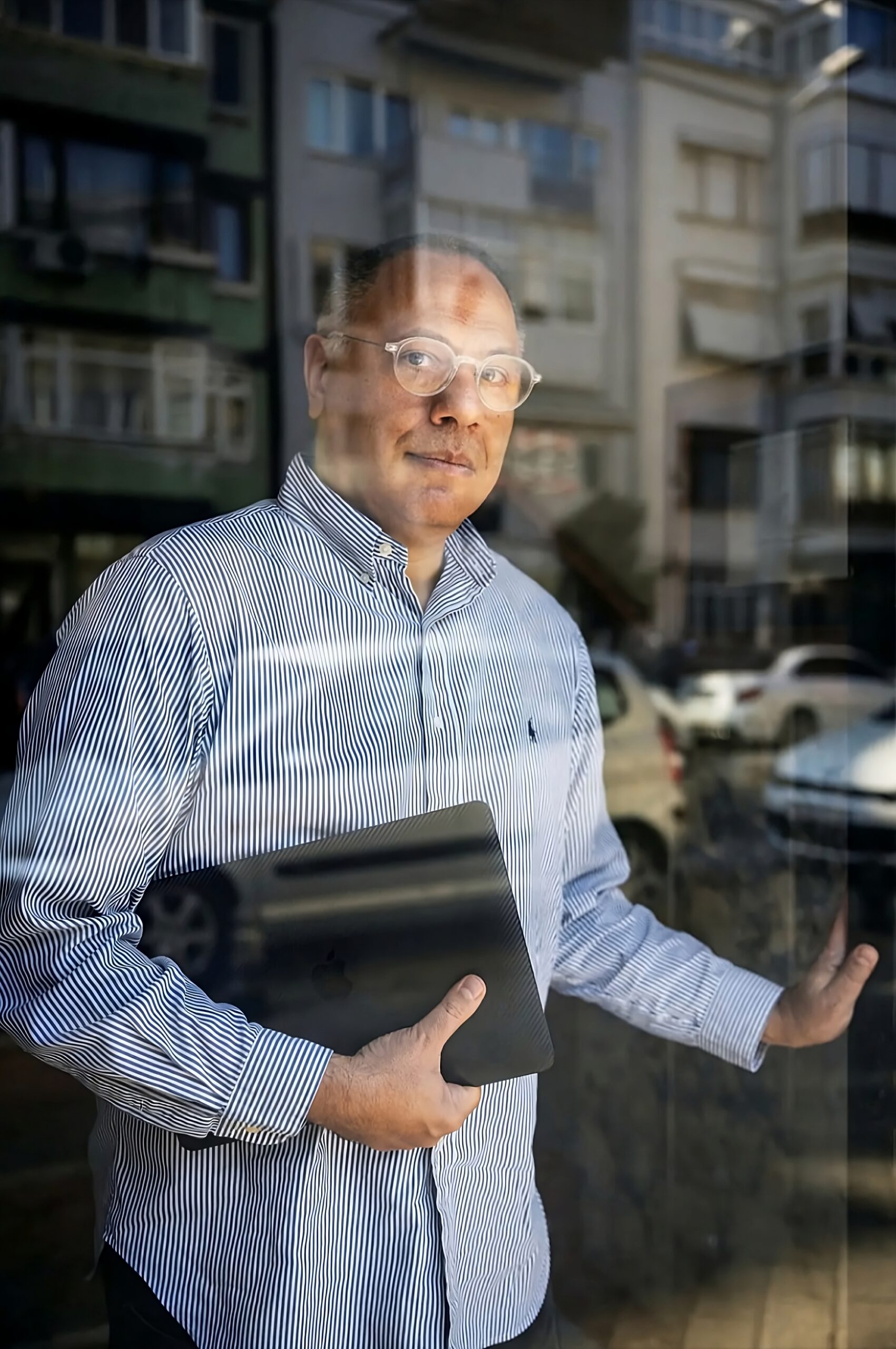Sometimes, authorities tell us that the strategic litigation cases we pursue are futile. Even if you win these cases, nothing will change, they say. But from a historical perspective, documenting the human rights abuses is particularly important. And we should never normalize censorship. Defending human rights today is defending the future and democratic principles tomorrow, says Yaman Akdeniz, Law Professor at Istanbul Bilgi University and co-founder of İFÖD – the Freedom of Expression Association.
Yaman Akdeniz is also an inaugural recipient of the CGFoE Award for Excellence in Legal Services, recognized for his work on a ruling by the European Court of Human Rights that found blocking access to YouTube violated Article 10 of the Convention. As part of CGFoE’s “Portraits of FoE Defenders” series, Marija Šajkaš, CGFoE’s Senior Communications Manager, spoke with Akdeniz about the current situation in Türkiye and the future of freedom of expression.

Dr. Yaman Akdeniz is a Law Professor at Istanbul Bilgi University and co-founder of İfade Özgürlüğü Derneği, İFÖD – the Freedom of Expression Association. Photo: courtesy of Yaman Akdeniz
Marija Šajkaš: Let us start with some positive news. A few weeks ago, the Constitutional Court of Türkiye published a decision concerning the violation of your right to freedom of expression.
Yaman Akdeniz: The Constitutional Court ruled unanimously that the Ministry of Justice violated my right to freedom of expression by refusing to provide statistical data on investigations and prosecutions under Articles 299 (Insulting the President) and 301 (Insulting the Turkish Nation/State) of the Turkish Penal Code. The Court rejected the administration’s long-standing defense that compiling this data required “separate or special work,” effectively stripping the administration of its discretion to withhold such data when a final judicial decision already exists. The Court explicitly recognized my role as an academic and a “public watchdog” once again, following its Yaman Akdeniz (2) decision. The Court ruled that access to this specific data is essential for the applicant to inform the public and contribute to democratic debate, making the refusal an interference with his freedom of expression. As of today, the Ministry of Justice has yet to release the information.
This seems to fit the pattern you described in the recently published Annual EngelliWeb censorship report. Here, you call it a “Kafkaesque” environment, where the judiciary acts as an automatic approval mechanism for censorship requests, often ignoring the Constitutional Court’s rulings.
Türkiye’s freedom of expression landscape remains deeply troubling, marked by an escalating clampdown on dissent through legal, technological, and political means. This is nothing new, unfortunately. And over the past decade, the government has intensified its use of online censorship, defamation laws, anti-terrorism legislation, and, more recently, the crime of disinformation and the ongoing charges of insulting the president of Türkiye to silence opposing voices. Despite this hostile environment, organizations like ours continue to push back. Through strategic litigation, we have helped secure over 380 violation rulings from the Constitutional Court, including a landmark 2022 decision that annulled infamous Article 9 of the Internet Law with regard to protecting individuals from defamation and personal rights.
Türkiye’s scale of censorship, with nearly 1.2 million websites blocked, sets us apart
Some of the numbers from your recent report are staggering. By the end of 2024, the cumulative number of blocked websites and domain names in Türkiye reached 1,264,506. In 2024 alone, access was blocked to 311,091 websites. This is at least partly in relation to the civil unrest from earlier this year, and the detention of Istanbul mayor Ekrem İmamoğlu.
Yes, the numbers you cited represent a sharp increase compared to previous years. Access to popular platforms such as Roblox, Wattpad, and Discord was blocked during 2024 and remains blocked as of today. Instagram was also blocked for approximately 10 days. 2025 seems to be as bad as last year. Moreover, in addition to access-blocking, internet throttling was used in the first few days of İmamoğlu’s detention during March this year. Platforms such as X, YouTube, and Instagram were not accessible from Istanbul. In addition, for the first time, we witnessed that about 700 accounts were not only blocked but also made invisible from Türkiye by X, unless you had VPN access. A court decision blocked access to a number of postings by Grok. I have not seen any other country simultaneously rush to the courts to block access to certain postings and start a criminal investigation involving them, which is what happened in the case of Grok. Türkiye’s scale of censorship, with nearly 1.2 million websites blocked, sets us apart.
X is swiftly ensuring that some accounts are not visible from Türkiye
Did I understand you correctly? Following the government’s complaint, X rapidly limited the visibility of about 700 accounts?
Let me explain it briefly. Before Elon Musk took over, we had a much more protective platform. Twitter in the past received a roughly equal number of access-blocking decisions from Türkiye, but its former human rights and legal teams assessed these decisions and, when they realized the requests involved academics, journalists, media organizations, and politicians, ignored them. And they even took the risk of being access-blocked, or investigated, or fined administratively. However, since Elon Musk took over, things changed fast. We witnessed, for the first time, an immediate blocking of certain accounts in Türkiye during the last general elections in May 2023. But this year, in particular, after the arrest of Istanbul Mayor Ekrem İmamoğlu, we identified over 700 accounts that belong to well-known journalists, academics, human rights organizations, women’s organizations and movements, and student groups. Of course, the names of these accounts appeared in access-blocking decisions, but very swiftly, acting like a law enforcement agency, X ensured that they were not accessible to people in Türkiye. X did the same with Ekrem İmamoğlu’s account, which had almost 10 million followers a few months ago. So nowadays, as soon as X receives these access-blocking decisions, they comply without further questions. Through their global affairs account, they made an announcement that they challenged some of these decisions. But lack of transparency means it’s not clear whether X systematically appeals against all these decisions, or if the appeals are rejected, which is more likely, and whether X takes these cases to the Constitutional Court. So, in terms of social media platforms, things have moved from bad to worse.
There has been an obvious lack of transparency in Türkiye for many years. How do you obtain reliable data under these conditions?
Since the Turkish Telecommunication Authority does not publish statistical information about the number of access-blocked websites, we developed a tool that “crawls” through the Internet, trying to find blocked websites, including high-profile ones, news articles, and social media accounts. We gather that data and make it public. We also have an emergency detection system set up, and, for example, last August, we detected blocked access to Instagram before anyone else realized it was taking place: at five o’clock in the morning, we received a notification on our phones and verified it; by six o’clock in the morning, we notified everyone in Türkiye. Even the Meta representatives didn’t know because they were not informed about the decision. And their London team phoned me asking, “Are you sure?” We said, “Yes, of course, we are sure. We don’t just publish speculation.” Our technical expert further develops this system, and we will continue to make censorship and access-blocking practices more transparent.
I often read the CGFoE newsletter with a cup of tea on Saturday mornings
How can we help? Do the resources provided by Columbia Global Freedom of Expression contribute to your work?
I personally use the Case Law database frequently, and I’m impressed by how it has developed. I also rely upon comparative research and use the Special Collection papers to build our legal arguments in strategic litigation. But primarily, we use the database for checking on comparative jurisprudence-related developments. Also, the newsletter, from my point of view, is a critical tool. It helps me and our legal team stay informed about developments elsewhere. This is the only newsletter I am subscribed to, and I often wait to read it with a cup of tea on Saturday mornings. Protecting freedom of expression requires collective resilience, and it’s an ongoing battle. Whether you’re a lawyer, journalist, activist, academic, or student, we have to keep resisting. Sometimes, authorities tell us that the strategic litigation cases we pursue are futile. Even if you win these cases, nothing will change, they say. But from a historical perspective, documenting the human rights abuses is particularly important. And we should never normalize censorship. Defending human rights today is defending the future and democratic principles tomorrow.
Right now, in so many places, it feels as if the capacity for change is limited and progress is painfully slow. Where do you find the strength to keep going?
The main strength now comes from my daughter. They teach children that bad people go to prison, and she was about six years old when she overheard me talking to an imprisoned journalist. So, I needed to teach her that Türkiye is different, and that here, not only bad people go to prison but also good people, and that there is always that risk. It’s important to inspire the younger generation to follow our steps. That’s why we formed the Freedom of Expression Association, IFÖD, back in 2017, during the ongoing state of emergency, and two years ago, we managed to obtain a special consultative status from the United Nations, a big milestone for us. I think that the work we do is important and not futile. It is all about trying to inspire youngsters and showing that we are not afraid.

